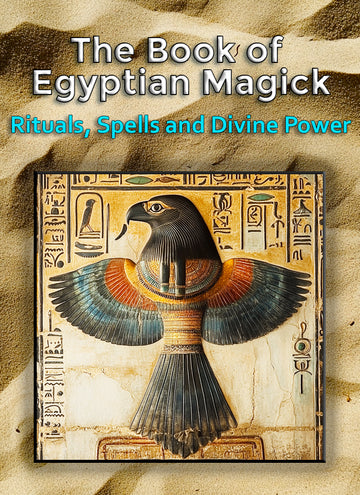The Power of Names: Secret Names and Their Magickal Use
Share
The Power of Names: Secret Names and Their Magickal Use
The concept of names holds profound significance in many spiritual and magickal traditions, especially in ancient Egyptian magick. In this context, names are not merely labels or identifiers; they are imbued with power and energy. This chapter will explore the importance of names in magick, the concept of secret names, and their various applications in rituals and spells.
Understanding the Power of Names
Symbolism and Significance
In many cultures, it is believed that knowing the true name of a person, deity, or spirit grants the holder power over that entity. This belief is rooted in the idea that a name encapsulates the essence, attributes, and nature of the being it represents. In ancient Egypt, names were seen as integral to a person’s identity and power, often linked to their life force and spiritual essence.
Types of Names in Magick
1. True Names:
o Definition: These are the authentic, original names of deities, spirits, or powerful entities. They often reflect the essence and attributes of the being.
o Significance: Knowing a true name allows practitioners to call upon the entity with authority and intention.
2. Secret Names:
o Definition: These are names known only to a select few, often used in advanced magickal practices. They may include hidden or mystical meanings not apparent to outsiders.
o Significance: Secret names are believed to carry immense power, granting the practitioner enhanced ability to invoke or control the entity.
3. Descriptive Names:
o Definition: Names that describe the qualities or functions of a deity or spirit. For instance, a deity might have multiple names that highlight different aspects of their power.
o Significance: Using descriptive names can be effective in rituals, as they invoke specific attributes of the entity.
2. The Use of Names in Magickal Practices
Invocation and Evocation
• Calling Upon Deities: When invoking or evoking deities, using their true or secret names enhances the effectiveness of the ritual. Practitioners believe that correctly pronouncing a name can establish a stronger connection with the divine and summon the desired energies.
Spells and Rituals
• Crafting Spells: Names can be incorporated into spells to direct energy toward specific intentions. For example, writing a name in a spell can be an act of empowerment, channeling the essence of the entity into the working.
• Name Activation: The act of naming can activate the power of the spell, making the intentions more potent.
Meditation and Visualization
• Focus and Connection: During meditation, practitioners may focus on the names of deities or spirits to strengthen their connection and enhance their understanding of those entities. Visualizing the name while meditating can help to embody the energy associated with it.
Creating Sacred Space
• Naming the Space: When creating a ritual or sacred space, practitioners may invoke the names of protective deities or spirits to create a safe and empowered environment. This can include calling upon guardian spirits or invoking the energy of a specific deity.
3. The Practice of Naming in Ancient Egyptian Magick
The Role of Hieroglyphs
• Writing Names: In ancient Egypt, names were often inscribed in hieroglyphs, believed to hold inherent power. Writing a name in this sacred script was thought to invoke the essence of the being represented.
• Protective Amulets: Names of deities or sacred entities were frequently incorporated into amulets to offer protection and blessings.
Naming Rites
• Rituals of Naming: In ancient Egyptian culture, naming ceremonies were significant events, often conducted to bless and empower a child with a name that reflected their destiny or character. This practice emphasized the belief in the power of names to shape one’s fate.
The Secret Name of the Pharaoh
• Royal Names: Pharaohs were often given secret names that held magical power. These names were known only to a few and were used in rituals to connect the pharaoh to the divine and the protection of the gods.
4. The Ethical Use of Names in Magick
Respect and Intent
• Using Names Responsibly: Practitioners must approach the use of names with respect and clear intention. Misusing or manipulating names for selfish gain can lead to negative repercussions, both spiritually and personally.
Cultural Sensitivity
• Awareness of Cultural Context: When working with names from different cultures or traditions, it is crucial to honor the cultural significance and historical context behind those names. This respect fosters a deeper connection and understanding of the spiritual practices involved.
Protection of Secret Names
• Keeping Names Sacred: Secret names should be treated with reverence and kept confidential. Sharing them indiscriminately can dilute their power and integrity, potentially causing harm to the practitioner or the entity.
5. Practical Applications of Names in Magick
Creating Personal Names
• Magickal Names: Practitioners may choose to adopt a magickal name that resonates with their spiritual path. This name can serve as a tool for empowerment, self-discovery, and a deeper connection to their magickal work.
Using Names in Spellcraft
• Incorporating Names: When crafting spells, consider incorporating the names of relevant deities, spirits, or even personal names to enhance the intention and focus of the working. For example, if seeking protection, one might include the name of a protective deity.
Utilizing Names in Divination
• Name Interpretation: In divination practices, the interpretation of names can provide insights into personal power and potential. Analyzing the meanings and associations of names can offer guidance for the practitioner’s journey.
The power of names is a foundational element of magickal practice, particularly within ancient Egyptian traditions. Understanding the significance of true names, secret names, and their applications can greatly enhance a practitioner's ability to connect with spiritual energies and effectively conduct rituals.
Names are not merely identifiers; they are conduits of energy, intention, and divine essence. By approaching the use of names with respect, clarity, and purpose, practitioners can harness their transformative power to manifest their desires, deepen their spiritual connections, and navigate their magickal journeys.



